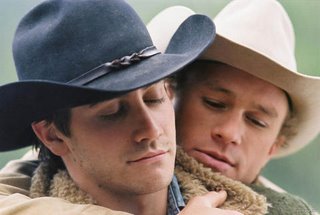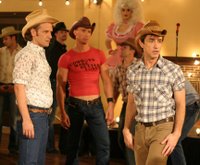A Belated Oscar Night Post
So, it's been a couple weeks since the Oscar Awards came and went. Now that the smoke has cleared and the dust settled, though, I think that many are still left wondering: What the hell happened? Of course, I'm speaking of the night's major upset, the out-of-nowhere win for Best Picture usurped by Crash that should have gone -- by almost all accounts -- to Brokeback Mountain.
 Almost as soon as the event was over, pundits began speculating over the reasons for the upset: Since most Oscar voters live in and around Los Angeles, a movie that specifically addressed the "L.A. experience" like Crash spoke to them more than one that dealt with rural life. Or perhaps people felt that Brokeback's widespread critical acclaim and the momentum it had gained in mainstream society was getting out of hand, and they rebelled against conventional widsom. Or maybe the movie just turned off too man older male voters who were not yet ready to see two cowboys getting it on at their local movie house. (Of course, an aggressive Oscar campaign that included DVD copies of the film being sent to every single voter didn't hurt.)
Almost as soon as the event was over, pundits began speculating over the reasons for the upset: Since most Oscar voters live in and around Los Angeles, a movie that specifically addressed the "L.A. experience" like Crash spoke to them more than one that dealt with rural life. Or perhaps people felt that Brokeback's widespread critical acclaim and the momentum it had gained in mainstream society was getting out of hand, and they rebelled against conventional widsom. Or maybe the movie just turned off too man older male voters who were not yet ready to see two cowboys getting it on at their local movie house. (Of course, an aggressive Oscar campaign that included DVD copies of the film being sent to every single voter didn't hurt.) Personally, I think that there is something to be said for all of these reasons, and I think all of them had a hand in the Oscar upset. And I'm pretty pissed off about it, too. To me, it feels like a rather blatant slap in the face, especially since Brokeback had won the top honor at virtually every other awards ceremony leading up to the Oscars. And to give the film major Oscars for Best Adapted Screenplay and Best Director, then deny it the big award just seemed like a big, fat, resounding kick in the nuts. What angers me most of all is that if you look at the critical response to Brokeback and Crash, Ang Lee's film had the advantage. It was, in fact, the best-reviewed film of 2005. By contrast, Crash, with its ridiculously convenient coincidences and obvious superiority complex ("Look how enlightened we are for talking about racism! Oh, by the way, you should all be ashamed of yourselves, you bunch of racists!"), was received tepidly by critics, with mixed reviews keeping it from winning all the adulation that went to Brokeback.
Personally, I think that there is something to be said for all of these reasons, and I think all of them had a hand in the Oscar upset. And I'm pretty pissed off about it, too. To me, it feels like a rather blatant slap in the face, especially since Brokeback had won the top honor at virtually every other awards ceremony leading up to the Oscars. And to give the film major Oscars for Best Adapted Screenplay and Best Director, then deny it the big award just seemed like a big, fat, resounding kick in the nuts. What angers me most of all is that if you look at the critical response to Brokeback and Crash, Ang Lee's film had the advantage. It was, in fact, the best-reviewed film of 2005. By contrast, Crash, with its ridiculously convenient coincidences and obvious superiority complex ("Look how enlightened we are for talking about racism! Oh, by the way, you should all be ashamed of yourselves, you bunch of racists!"), was received tepidly by critics, with mixed reviews keeping it from winning all the adulation that went to Brokeback.  Look, I liked Crash. When I first saw it, in fact, I loved it. It made me feel. It made me think. I saw the world differently when I left the theater. I felt as if I, too, had been in a crash of some kind. I usually dig that kind of experience. But the more I thought about the movie, the more its many flaws began to reveal themselves to me. I realized that I had mistaken spectacle for depth, and it was then that I figured out that I had been manipulated into feeling an emotion that the film didn't earn on its own merits. It didn't tell a story; it forced one upon us. True, the acting in the film is nearly flawless on all accounts (it's a crime that Thandie Newton was not nominated for Best Supporting Actress), and that scene where Matt Dillon pulls Newton out of the overturned car is one of the most riveting I've ever sat through. But what bothers me about the movie now are all the little coincidences that populate it. Everything was too easy. Everything worked out just right at just the right time. "Oh, look how all these characters are interconnected and how they come into each other's lives at just the right moment. Amazing, huh? It really is a small world, isn't it?" (Actually, not so much.)
Look, I liked Crash. When I first saw it, in fact, I loved it. It made me feel. It made me think. I saw the world differently when I left the theater. I felt as if I, too, had been in a crash of some kind. I usually dig that kind of experience. But the more I thought about the movie, the more its many flaws began to reveal themselves to me. I realized that I had mistaken spectacle for depth, and it was then that I figured out that I had been manipulated into feeling an emotion that the film didn't earn on its own merits. It didn't tell a story; it forced one upon us. True, the acting in the film is nearly flawless on all accounts (it's a crime that Thandie Newton was not nominated for Best Supporting Actress), and that scene where Matt Dillon pulls Newton out of the overturned car is one of the most riveting I've ever sat through. But what bothers me about the movie now are all the little coincidences that populate it. Everything was too easy. Everything worked out just right at just the right time. "Oh, look how all these characters are interconnected and how they come into each other's lives at just the right moment. Amazing, huh? It really is a small world, isn't it?" (Actually, not so much.) On the opposite end of the spectrum was Brokeback, a film of such serene gentleness that its profound impact got lost on viewers bowled over by Crash's heavy-handed histrionics. "Brokeback was too slow," people keep saying. "The middle section of it was dull." As a screenwriter, it saddens me to see that people can be so restless, so enslaved by the ADD that Hollywood has inflicted upon them with too many action films. Apparently movies have to have high-speed car chases, things blowing up and bank robberies in order to be judged entertaining. Simple films, eloquent films, true-to-life films about everyday ordinariness are deemed to be "boring" and "pretentious." (I can't tell you how many otherwise intelligent people dismiss Sofia Coppola's brilliant Lost in Translation as nothing more than arthouse dreck, or the legions of Sideways-haters who couldn't connect to that film's many radiant charms.) Brokeback, with its understated performanes and languid pacing, delivered a message just as profound as that featured in Crash, but it did it without the heavy-handed ironies and the chest-thumping..
On the opposite end of the spectrum was Brokeback, a film of such serene gentleness that its profound impact got lost on viewers bowled over by Crash's heavy-handed histrionics. "Brokeback was too slow," people keep saying. "The middle section of it was dull." As a screenwriter, it saddens me to see that people can be so restless, so enslaved by the ADD that Hollywood has inflicted upon them with too many action films. Apparently movies have to have high-speed car chases, things blowing up and bank robberies in order to be judged entertaining. Simple films, eloquent films, true-to-life films about everyday ordinariness are deemed to be "boring" and "pretentious." (I can't tell you how many otherwise intelligent people dismiss Sofia Coppola's brilliant Lost in Translation as nothing more than arthouse dreck, or the legions of Sideways-haters who couldn't connect to that film's many radiant charms.) Brokeback, with its understated performanes and languid pacing, delivered a message just as profound as that featured in Crash, but it did it without the heavy-handed ironies and the chest-thumping.. The Golden Globes got it right when they snubbed Crash, failing to give it even a nomination. And yet it still snuck up on Brokeback and stole the Best Picture Oscar right out from under it. And I'm mad. I'm mad that Oscar voters thumbed their noses at the chance to make what could honestly have been a move for change. Brokeback, being the "big fat chick flick" that many are dismissing it as, may not be the most original movie ever made (yes, we've all seen the tragic love story before), but what it has going for it was its willingness to tell an authentic story of societal oppression's squelching of true love. Forget all the criticsm that the movie's tragic ending perpetuates the notion that gay love leads to unhappiness (such ridiculously reductive sentiments are usually only made by those who are all too happy playing the victim, it must be said); Brokeback showed those open enough to listen that love is something to be seized and celebrated, and it did it without being obvious about it. Its subtlety (like its simple, "boring" narrative) was its most powerful asset.
The Golden Globes got it right when they snubbed Crash, failing to give it even a nomination. And yet it still snuck up on Brokeback and stole the Best Picture Oscar right out from under it. And I'm mad. I'm mad that Oscar voters thumbed their noses at the chance to make what could honestly have been a move for change. Brokeback, being the "big fat chick flick" that many are dismissing it as, may not be the most original movie ever made (yes, we've all seen the tragic love story before), but what it has going for it was its willingness to tell an authentic story of societal oppression's squelching of true love. Forget all the criticsm that the movie's tragic ending perpetuates the notion that gay love leads to unhappiness (such ridiculously reductive sentiments are usually only made by those who are all too happy playing the victim, it must be said); Brokeback showed those open enough to listen that love is something to be seized and celebrated, and it did it without being obvious about it. Its subtlety (like its simple, "boring" narrative) was its most powerful asset. So what's next for gay and lesbian films? Well, we've got a surprisingly poignant German coming-out story (Summer Storm) hitting theaters March 24, and March 31 brings Craig Chester's amusing romantic comedy Adam & Steve. Sadly, both of these films will probably be relegated to quick arthouse releases, and it could be years before another film of Brokeback's magnitude is able to "break through" to the mainstream again. If the Oscars taught us anything, thought, it's that perhaps the world is simply not ready for such subject matter to be displayed on movie screens all over the country. And, far more than Brokeback's ending, that is a profoundly sad statement about society to be made.
So what's next for gay and lesbian films? Well, we've got a surprisingly poignant German coming-out story (Summer Storm) hitting theaters March 24, and March 31 brings Craig Chester's amusing romantic comedy Adam & Steve. Sadly, both of these films will probably be relegated to quick arthouse releases, and it could be years before another film of Brokeback's magnitude is able to "break through" to the mainstream again. If the Oscars taught us anything, thought, it's that perhaps the world is simply not ready for such subject matter to be displayed on movie screens all over the country. And, far more than Brokeback's ending, that is a profoundly sad statement about society to be made.XOXO,
Hollywood Ken
P.S: Don't forget to check out my brand new TV blog by clicking here!

0 Comments:
Post a Comment
<< Home